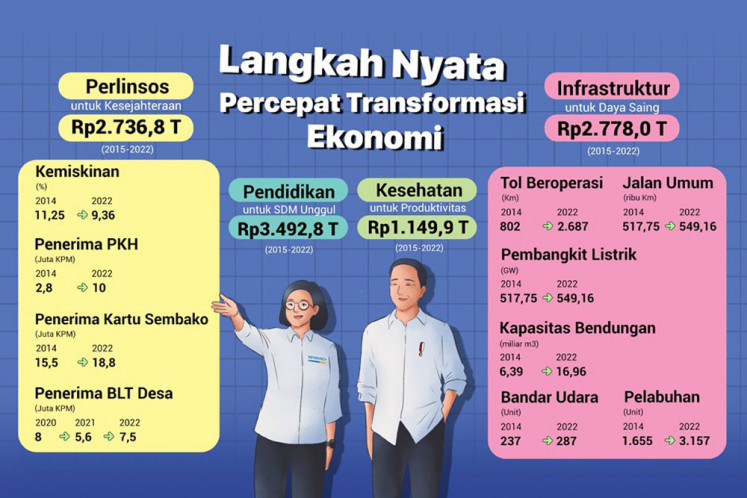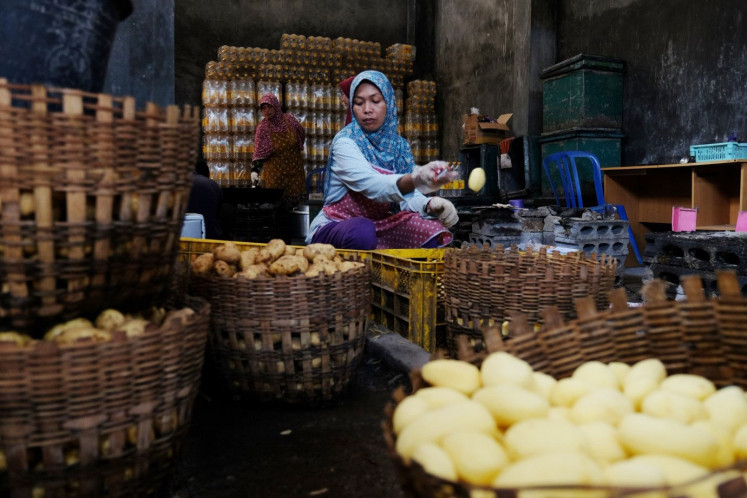Aqraa Sagir (The Jakarta Post)
Jakarta ●
Sat, September 30, 2023
To ensure the reliability of the state budget in improving the welfare of the Indonesian people, it must be closely monitored. One way to achieve this is by implementing more critical spending, or quality spending. Through this approach, the APBN can remain effective in stimulating the Indonesian economy.
Head of the State budget Policy Center at the Fiscal Policy Agency (BKF) Wahyu Utomo stated, “The state budget is not just numbers. Instead, it is an instrument that contains direction and strategy.”
Wahyu elaborated further on the concrete evidence of quality spending that the government has undertaken in this past decade. This evidence includes the improvement of the quality of human resources (HR) and infrastructure, both of which are sectors that are crucial in accelerating inclusive and sustainable economic transformation.
To achieve improvements in HR, spending on education within this area has successfully increased the number of schools across the country. With a notable increase of 1.5 thousand, 4.9 thousand, and 3.6 thousand for elementary schools (SD), junior high schools (SMP) and high schools/vocational schools (SMA/SMK), respectively.

Every Monday
With exclusive interviews and in-depth coverage of the region’s most pressing business issues, “Prospects” is the go-to source for staying ahead of the curve in Indonesia’s rapidly evolving business landscape.
for signing up our newsletter!
Please check your email for your newsletter subscription.
View More Newsletter
The growth in the number of schools also correlates to an increase in the average length of schooling from 7.85 years to 8.87 years for female students and from 8.61 years to 9.28 years for male students.
Furthermore, during the same period, spending on healthcare was optimized to improve the sector’s productivity. This can be seen by an increase in the number of public hospitals, which grew from 1,855 to 2,522. Additionally, a significant reduction in stunting prevalence has also been recorded because of this spending, dropping from 37.2 percent in 2013 to 21.6 percent in 2022. The allocation of funds for COVID-19 management from 2020 to 2022, which included vaccination efforts, successfully alleviated the pandemic’s impacts on Indonesia.
“This means that the utilization of funds for education and healthcare to support superior human resources has had a noticeable positive impact. With clear improvements in the quality of education, and the quality and delivery of healthcare services,” Wahyu added.
 . (Source: The Finance Ministry/.)
. (Source: The Finance Ministry/.)
Moreover, the Indonesian government has focused on quality spending that is aimed at reducing national poverty levels. This is achieved by protecting the purchasing power of the people through various social assistance programs and targeted subsidies.
Since 2014 poverty rates have significantly decreased. In 2014, the poverty rate was 11.25 percent, which decreased to 9.41 percent in 2019. In 2023, the poverty rate is 9.36 percent, showing a further decline. This reduction in poverty rates is inversely correlated with the growth in coverage of the Family Hope Program (PKH), which increased from 2.8 million beneficiary families in 2014 to 10 million in 2022.
Furthermore, because of the government’s strategies, unemployment rates have also decreased. From 2014 to 2019, 17.9 million jobs were created, with only a slight dip in 2020 of around 0.3 million because of the pandemic.
Economic recovery efforts during 2021 and 2022 created 6.8 million jobs, reducing the unemployment rate in Indonesia to 5.45 percent in 2023.
On top of its efforts to improve the quality of HR, the Indonesian government also recognizes the need for adequate infrastructure to achieve its vision as a developed nation. Therefore, the government continues to invest in infrastructure development to enhance productivity, connectivity and competitiveness.
These developments include the expansion of the total length of operational toll roads from 802 kilometers in 2014 to 2,687 km in 2022, an increase in the total length of public roads from 517,750 km in 2014 to 549,160 km in 2022, a sharp increase in electric capacity from 53 gigawatts (GW) in 2014 to 81.20 GW in 2022, an increase in dam capacity from 6.39 billion cubic meters in 2014 to 16.96 billion cubic meters in 2022, growth of the number of airports from 237 in 2014 to 287 in 2022 and an increase in the number of operating ports from 1,655 in 2014 to 3,157 in 2022.
 Courtesy of Finance Ministry (Source: The Finance Ministry/.)
Courtesy of Finance Ministry (Source: The Finance Ministry/.)
Because of these effective fiscal policies, Indonesia successfully mitigated the effects of the COVID-19 pandemic. After quick national economic recovery, the Indonesian economy emerged stronger, and currently has stable economic growth of 5 percent with inflation under control. Additionally, Indonesia was also able to play a role on the international stage amid global uncertainty, when in 2022, the country hosted the G20 Summit. In 2023, Indonesia also successfully organized the ASEAN High-Level Conference.
“This is once again concrete evidence that development is carried out with dedication. Budgets have increased, accompanied by increased output and outcomes,” Wahyu commented.
Therefore, state budget fiscal policies can respond to economic dynamics, addressing economic challenges and supporting development agendas. So far, the state budget is being executed effectively in line with its tasks and functions, serving as a shock absorber to stabilize the Indonesian economy. With its allocation function as a development agent, it primarily drives economic transformation, also performing a distribution function for the welfare of the Indonesian people.
“One of the prerequisites for advancing toward a developed Indonesia is to escape the middle-income trap, and the way to do it is to accelerate economic transformation,” closed Wahyu.
This article is based on information provided by the Finance Ministry

